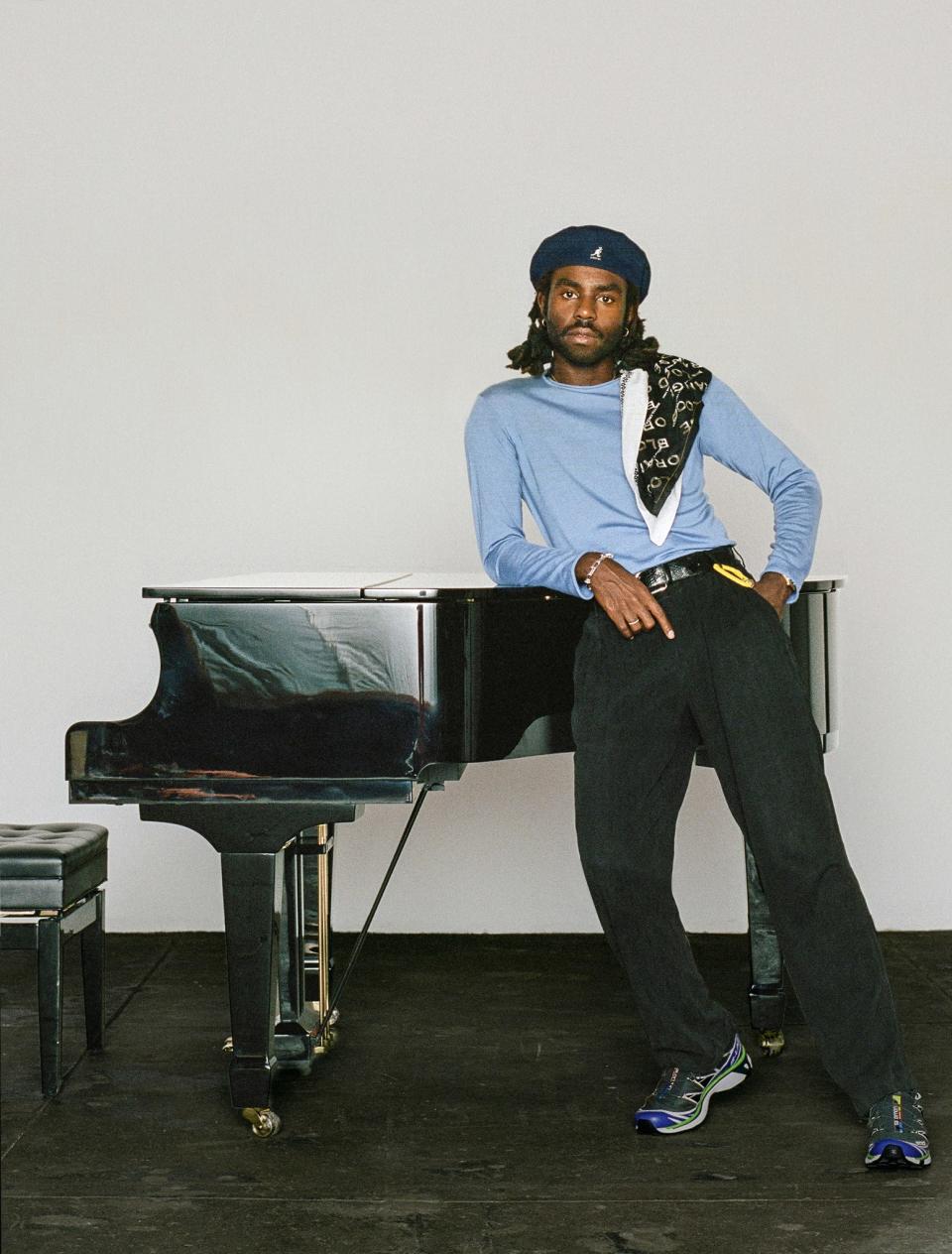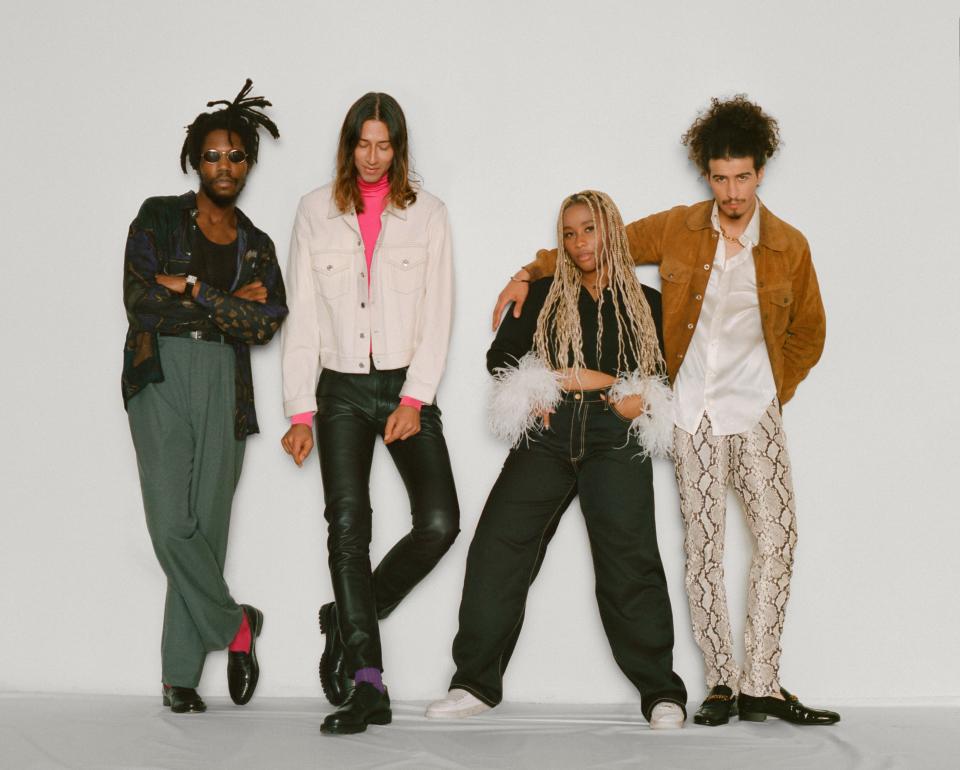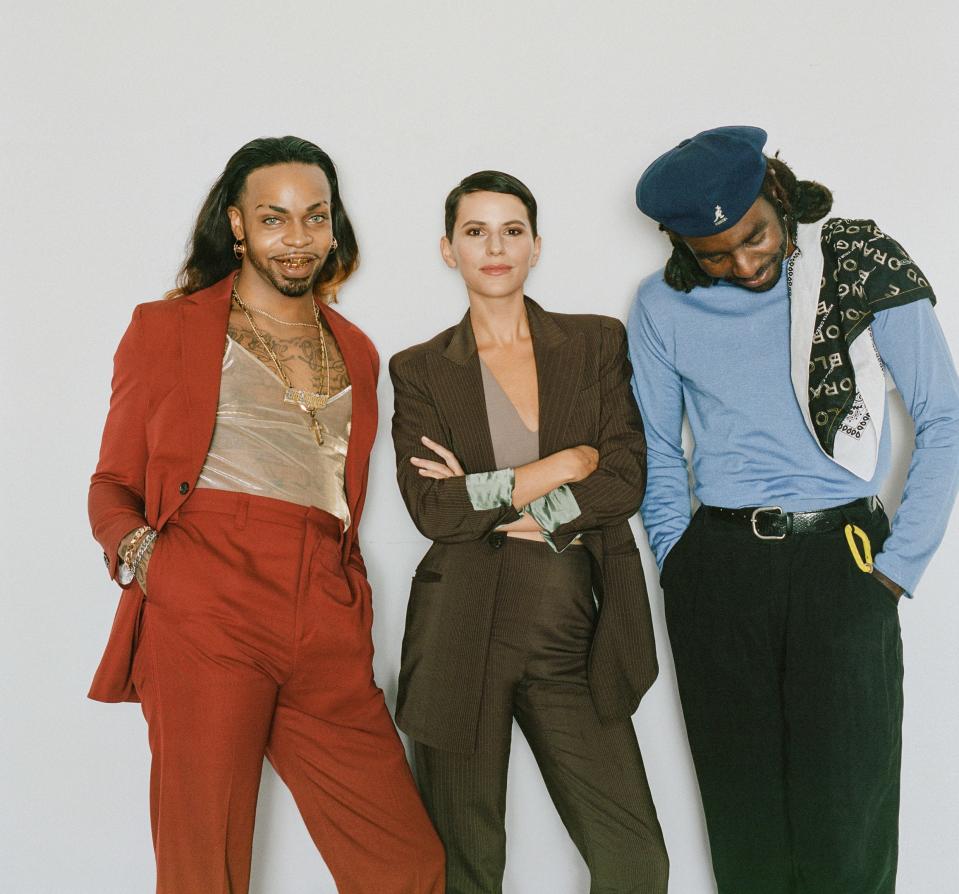The Awesome Orbit Of Dev Hynes
Devonté Hynes is perched at a baby-grand piano in a Manhattan photo studio, a Kangol hat over his dreads like a crown, his dad-style Salomon sneakers pushing softly on the instrument's pedals. The space is crowded with friends and associates, all contributors on Negro Swan, Hynes's latest album under his music moniker, Blood Orange. His face focused and stern, he summons delicate melodies from Philip Glass, Claude Debussy, and Frédéric Chopin (Prelude in C Minor) as if there isn't another person on earth but him. “I can make music anywhere,” he'll tell me later. “I'm just in it. Nobody else is there.”
Hynes, who goes by Dev, makes art out of aloneness, but his life is also a triumph of collaboration. In New York he often seems like the most popular kid in town—the mutual friend among the city's art, fashion, and music worlds. And Negro Swan is stuffed with about 30 guest appearances, including but not limited to Sean “Diddy” Combs, A$AP Rocky, and the trans activist and writer Janet Mock. The six on set today include Austin Williamson and Isaiah Barr of the jazz troupe Onyx Collective; the singers Eva Tolkin, Ian Isiah, and Zuri Marley (granddaughter of Bob Marley); and Hynes's longtime collaborator Adam Bainbridge, better known as Kindness. They're dressed like they stepped out of a Benetton ad from the '90s. The vibe in the room is ebullient, but there's a sense of solitude, even sadness, on Negro Swan, in the plaintive jazz tones and in songs about the pernicious experience of being an outsider, which he has felt since childhood. “It's about acknowledging where I am and looking back. I've always been someone who lives in his head,” he says with a sphinx-like smile. “I call Negro Swan group music made in isolation.”

These days, in a wardrobe of black leather and relaxed oversize jackets, almost always a hat on his head (from kufis to baseball caps), Hynes is a picture of city cool, so much so that he was flown to Paris last summer to walk the runway for his friend Virgil Abloh's debut show at Louis Vuitton. But what's considered special about him now made him a target as a kid, and he grew up an odd duck in East London, a black skater/music geek who painted his nails and was also a star soccer player. He was bullied—he sings on the LP's opening track, “Orlando,” that he'd get sucker punched down—but he also had a dreadful ache that London just wasn't it and a feeling that New York was.
He's a classically trained cellist, but he'd read Please Kill Me: The Uncensored Oral History of Punk, about the wild history of American rock. After a few young-adult years playing music around London, one day, on a whim and a visa secured for an aborted tour with an early band, Test Icicles, Hynes came west, crashing for around $300 a month on the couch of “a friend of a friend's ex-roommate” in Queens in 2008. He was 21. “Even now,” he says, “it matches the fantasy I had in my head. Even when I'm fuckin' sick of New York City, it's still cool.”

Though he recorded Negro Swan traveling around and on tour in support of his last album, 2016's Freetown Sound, it sounds like a cultural field recording of Manhattan, with streaks of R&B and hip-hop and Hynes's lovely falsetto. Monologues are stacked on top of ambient noise on top of pretty melodies, and listening to it is like you opened an East Village window and let sidewalk chatter battle it out with a Spotify playlist from your laptop speakers. Williamson, the Onyx Collective drummer, tells me he'll bump into Hynes when they're out in the world, the singer taking it all in. “I'll see him, no headphones on, just listening,” says Williamson. “He captures the city so intimately.”
Hynes has a romantic ideal of bohemian fellowship, the hard-fought reward of moving to this expensive, messy, promising city. “I think of family as community.… We are not limited by biology.… And we get to make our family,” as Mock says on Negro Swan. Hynes would try to capture his friends' contributions wherever he could, and since he recorded much of the album on the road, he had to conjure intimacy out of thin air, often setting up mini-studios in hotel rooms. “I have a travel bag of makeshift stuff,” he says. “Microphones, drum machine, hard drive.” Friends say he has a remarkable way of turning any place into a sacred chamber. “He makes a very safe space in the studio,” says vocalist Eva Tolkin. She's toured with Hynes as a backup singer and credits him with helping her find the confidence to sing in the first place: “I only realized I had a good voice when I started singing with Dev.”

I ask Isiah, who is sitting on a couch in the back of the studio perfecting a blunt with sparkly fingernails, wearing a brassy lion's mane of ombré hair and what appears to be sheer gold chain mail, if Negro Swan is something of a symphony created by an orchestra of friends, with Hynes as the conductor. “Symphony? Girl, this album is a musical,” he replies, arguing that beyond the pure allure of the sound, Hynes has something profound to say. Isiah describes it as a story of one black man's journey to self-awareness, of finally finding a place in the world. “No one wants to be the ugly little duckling, always considered different just because you're black,” says Isiah, whose own music is a singular blend of R&B, trap, and gospel. “Negro Swan is another way to say: dark and lovely. It's melanin awareness.”
Still, it's hard to square Isiah's triumphant description with the melancholy in the music, plus the stoic Hynes playing Chopin while friends chop it up in the background. At the end of the day, Hynes has reclined onto a couch. He's wearing a black Louis Vuitton vest over a green hoodie, all accented by pink eyeglasses and a glittering diamond bracelet and ring from Tiffany & Co. I wonder if making songs, even with friends, is like sitting at a piano in a room full of people: The energy is everyone's, but it's one person at the heart of the harmonies. Hynes says he's more like a film director—it's his idea, but he has to hire actors and lighting people to bring it to life. “My ultimate goal is to appease me,” he says. “It's my vision, from beginning to end.”

Alex Frank is a freelance writer and editor based in New York.
A version of this story originally appeared in the February 2019 issue with the title "The Awesome Orbit Of Dev Hynes."
Watch:

